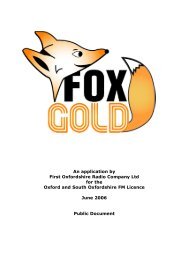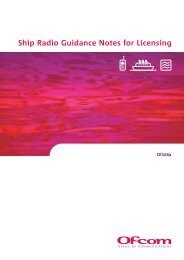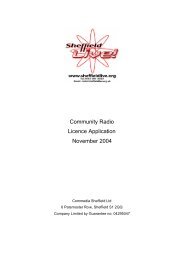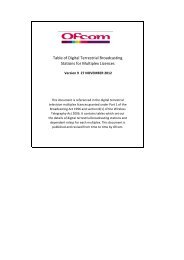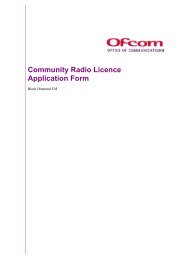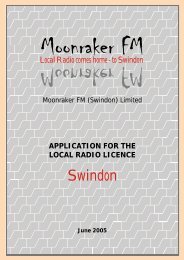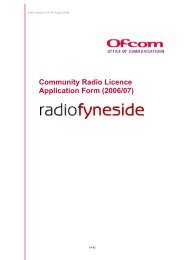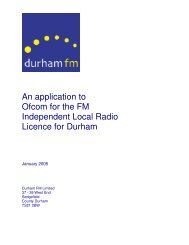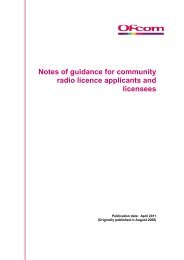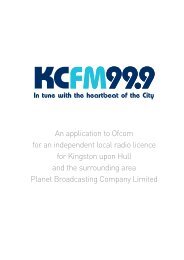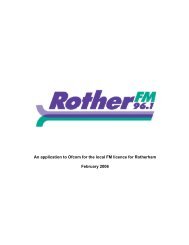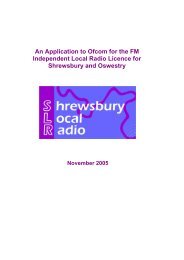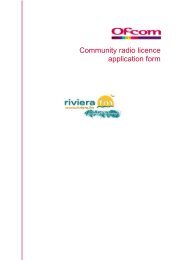Radio Plymouth - Ofcom Licensing
Radio Plymouth - Ofcom Licensing
Radio Plymouth - Ofcom Licensing
You also want an ePaper? Increase the reach of your titles
YUMPU automatically turns print PDFs into web optimized ePapers that Google loves.
Conclusions for <strong>Radio</strong> <strong>Plymouth</strong><br />
RADIO PLYMOUTH<br />
Young people are well-served by existing services. Above the age of 25, people do listen to local<br />
commercial radio, but are not particularly satisfied. In a city of limited choice, with services that do<br />
well among the under 25s (<strong>Plymouth</strong> Sound) and over 55s (<strong>Radio</strong> Devon), the target audience is<br />
clear. But care must be taken not to be simply another service people listen to by default: just<br />
because it’s there and it’s for <strong>Plymouth</strong>. It has to meet their needs, for “better music” and “more<br />
professional presentation”.<br />
e) Focus Groups (sample: 30)<br />
Three x 10 commercial radio listeners in <strong>Plymouth</strong>, aged 25 to 54<br />
Our three focus groups of existing local commercial radio listeners highlighted many concerns that<br />
we can define as the 3Ps – professionalism, programmes, presenters.<br />
Professionalism<br />
Reflecting <strong>Ofcom</strong>’s own research, which found that local stations were considered to be a bit<br />
amateurish, our groups were vocal about professional standards. In particular, they expressed the<br />
opinion that there is “too much mindless drivel” and “too much yapping” on some commercial<br />
stations. Especially <strong>Plymouth</strong> Sound at breakfast.<br />
Professionalism extends to commercials. Not only are they repetitive, but they are sometimes poorly<br />
written and produced. This is often a problem with local classified advertising which needs an<br />
address or difficult to remember phone number for the advertiser to realise profitable business as a<br />
result.<br />
Conclusions for <strong>Radio</strong> <strong>Plymouth</strong><br />
The major difference between <strong>Plymouth</strong> and Cornwall is in satisfaction with existing commercial<br />
radio. Recent research conducted by the successful applicant for the Cornwall licence showed<br />
there was little stated gap in the market for a distinctly new service, with audiences in Cornwall<br />
generally happy with Pirate FM. This contrasts with the evidence in <strong>Plymouth</strong>, our focus groups<br />
suggest that many listeners in the city are choosing to tune to Pirate FM rather than their own local<br />
radio station.<br />
<strong>Radio</strong> <strong>Plymouth</strong> will address the concerns raised in our focus groups about advertising through<br />
scheduling, encouraging copy rotation for larger campaigns and by placing a nine minute limit of<br />
commercial air time.<br />
Programmes<br />
Because of the amount of chat and commercials, there’s not enough music at breakfast on<br />
<strong>Plymouth</strong> Sound. News is “too lightweight” or “not relevant” – although the travel is considered<br />
good.<br />
55



